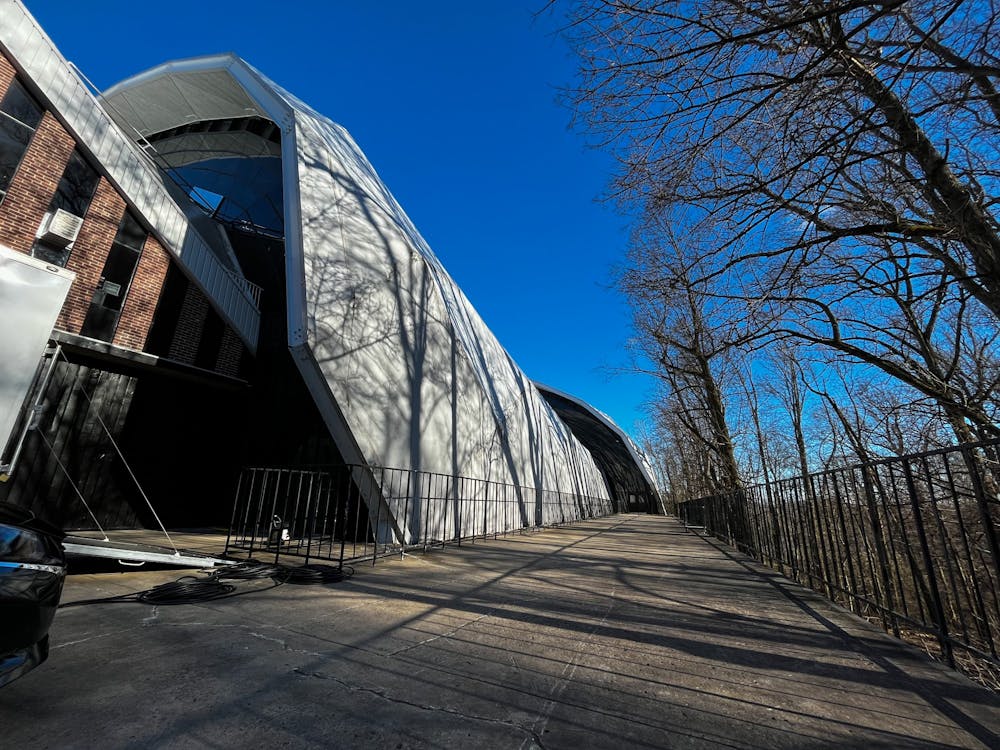On Tuesday, March 7, two Brown basketball players filed a lawsuit in federal court in the United States District Court in the District Court of Connecticut, accusing the eight Ivy League institutions and the Ivy League Council of Presidents of violating antitrust law by refusing to offer athletic scholarships.
The plaintiffs, current Brown University women’s basketball player Grace Kirk and former Brown men’s basketball player Tamenang Choh, allege the “Ivy League Agreement” — an accord between the league’s eight member institutions not to offer athletic scholarships, which has been formally in place since the founding of the Ivy League as an athletics conference in 1954 — is illegal, on the grounds that it violates the Sherman Antitrust Act of 1890. The accord is explained under their Joint Statement for Candidates on Common Ivy Admission Procedure.
In a statement to The Daily Princetonian, University Spokesperson Michael Hotchkiss wrote, “The University is still evaluating the complaint, but is confident it abides by the antitrust laws and intends to mount a vigorous defense.”
The lawsuit, a class action complaint, contends that the Agreement violates the Sherman Act for two reasons. Firstly, the lawyers representing Kirk and Choh claim the member institutions of the Ivy League have participated in price-fixing — illegal collaboration between entities to inflate prices — because the absence of athletic scholarships keeps tuition at the institutions higher than it would have been had the Agreement not been in place.
From 1992 through 2022, an exemption in federal antitrust law, expanded under the Improving America’s Schools Act of 1994, allowed for schools to legally price-fix by aligning with one another on financial policies such as the alignment seen in the Agreement. Section 568 allowed this practice so long as schools’ admissions processes were need-blind, thus supposedly nullifying the effect of the inflated tuition on students’ ability to pay. When this exemption expired last September, the door was opened for the Ivy League to be sued for the now-illegal practice.
The second reason the filing gives as a violation of the Sherman Act is that the Agreement’s prohibition of payment of any kind for athletes represents a conspiracy to withhold compensation from student-athletes. In 2021, the Supreme Court ruled in NCAA v. Alston that limiting athletic scholarships to cost of attendance — room, board, and tuition — was unconstitutional based on Section 1 of the Sherman Act.
As a result of the Alston ruling, meaning that schools must not prohibit aid towards the cost of computers and other out-of-pocket, school-related expenses. Ivy League institutions offer no athletic scholarships, making the impacts of the ruling unclear.
Just nine days after the Alston decision, the NCAA announced that it would allow student-athletes to license Name, Image, and Likeness (NIL) rights.

Kirk, who has played basketball at Brown since 2020, and Choh, who played from 2017–22, were both awarded “need-based financial aid, which did not cover the full cost of [their] tuition, room, and board, and incidental expenses,” according to the lawsuit.
“In either case, regardless of whether considered as a restraint on the price of education, the value of financial aid, the price of athletic services, or the level of compensation to Ivy League athletes, the Ivy League Agreement is per se illegal,” the filing reads.
The plaintiffs are seeking tripled damages for all Ivy League athletes who have competed since March 2019, as well as injunctive relief to put an end to the Ivy League Agreement’s prohibition of athletic scholarships. Assuming about 250 athletes per undergraduate class at Princeton, the decision could impact about 2,000 current and former Princeton student-athletes.
The lawsuit states that across the Ivy League, “there are over 10,000 Class Members, who are geographically dispersed around the country.”

According to Princeton’s admissions website, roughly 18 percent of the undergraduate student body participates in varsity athletics across 38 varsity teams.
When the antitrust exemption expired in September, some student-athletes told the ‘Prince’ that they would appreciate compensation for their athletic contributions to the school, with some expressing that Princeton’s lack of athletic scholarships was an important factor they had to consider when choosing which college to attend.
“During my recruitment process, I was interested in quite a few schools that had offered me scholarships to play for them,” Justin Kim ’26, a member of the baseball team, told the ‘Prince’ in October. “This made my decision to commit to Princeton very tough because I knew I'd be in debt upon graduation.”
Wilson Conn is a head editor for the Sports section at the 'Prince.'
Annie Rupertus is an associate editor for the News section at the ‘Prince.’
Please direct any corrections requests to corrections[at]dailyprincetonian.com.








